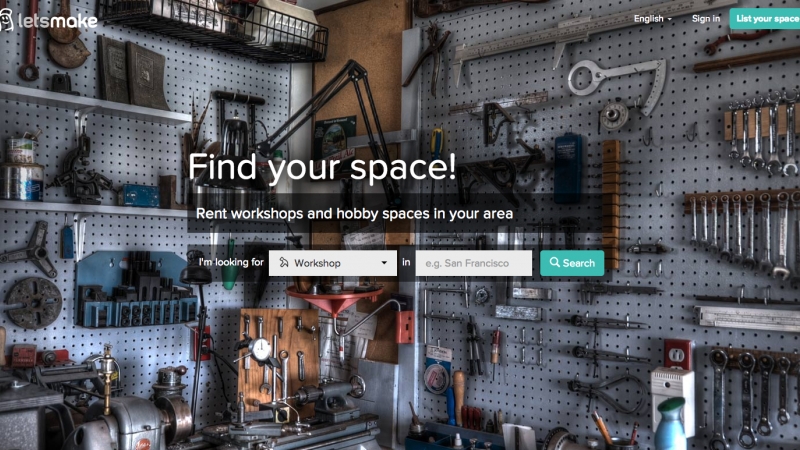Nobody stands in front of the Mona Lisa or the Venus de Milo and says, “Wow. The Louvre really makes some amazing art.” We applaud the artists themselves. Yet, this principle hasn’t always translated to the business world, where big companies tend to get the credit for the creativity and drive of the individuals they employ.
That’s starting to change.
Developers of software-as-a-service solutions, share platforms, and vertical marketplaces, are empowering individual entrepreneurs and small teams to launch big ideas into the world with unprecedented speed. You don’t need to be a large company to prototype with 3-D printing any more. There’s New Matter. Can’t afford buy or lease a building? Space solutions like Desks Near Me, Let’s Make and BoxBee abound. On the smallest scale, new platforms emerge regularly that allow individuals to leverage their time, skills and resources to sustain themselves on personal levels.
The growing importance of these small guy-supporting startups is evidenced by forward-thinking venture capital firms that have started targeting them. For instance, the partners at Homebrew VC have even coined a term for them: Bottom up companies.
In short, they’re enterprises that streamline entry to market, take friction out of offering assets directly to customers, and allow individuals and small businesses to drive cultural and economic growth by opening access.
They’ve collectively become a pillar of a rapidly evolving marketplace that is increasingly being defined by creative solopreneurs and lean startups. Innovation no longer trickles down from the rarefied strata of the tech elite — it bubbles up.
Cool, right?
Here’s how Homebrew’s Hunter Walk and Satya Patel put it:
A Bottom Up Economy is a self-starter economy, driven by a workforce that is being pushed toward innovation. Their business models rely on creating real, tangible value for their customers. They believe the problems they solve are empowering people.
We couldn’t agree more. Here are 11 of our favorite bottom up startups you didn’t know were boosting innovation.
Company: Shyp
What they do: Make shipping as simple as answering the doorbell.
Why they’re great: Handing over an important package 10 minutes after pressing “go” on Shyp’s mobile app is a little scary the first time. After all, we’re used to waiting in line, weighing boxes, handwriting addresses in triplicate – the works. Shyp cuts out the struggle and let someone else professionally package items, enabling entrepreneurs to focus on product rather than delivery logistics, taking away a major headache for small businesses. It also seems a little genius.
Company: RiffRaff
What they do: Help people monetize their hobbies by sharing their skills with others.
Why they’re great: We all have a pastime we’ve invested time and energy to learn more about. Maybe it’s kite boarding, painting, tennis, or competitive falconry. RiffRaff makes it easy for skilled enthusiasts to connect with the members of their community who want to learn something new. When you don’t have to be a pro to teach what you know, you can make money doing what you love. Chalk another one up for the solopreneurs.
Company: IFTTT
What they do: Allow small businesses to automate all sorts of online (and, increasingly, Internet of Things) functions through simple action-reaction recipes.
Why they’re great: Techcrunch calls them the glue gun of the Internet, and that’s a pretty apt description. Sure, you may not need your plants to email you when they’re thirsty (totally possible). But it’s pretty handy to get a text message whenever someone orders from your small Etsy boutique or to auto-generate an email when a client has a birthday. That’s big company-style customer care.
Company: Let’s Make
What they do: Link professional makers and amateurs alike to local unused workspaces and commercial kitchens.
Why they’re great: Let’s face it, many of us have small apartments. And even if they were palatial, we likely wouldn’t have space to arc weld or have access to the city-approved facilities to launch a commercial baking operation. With Let’s Make, we don’t have to. The startup gives makers access to dormant facilities and – in many cases – even the tools they need to begin their own businesses.
Company: Zen Payroll
What they do: Take the pain out of running payroll.
Why they’re great: Few payroll systems would have the guts to call themselves “delightful.” This one definitely fulfills that promise. You just hit “run payroll.” It’s really that simple. Zen Payroll does all the dirty accounting work – like calculating withholdings, cutting checks and filing information with tax authorities – that make most entrepreneurs grimace.
Companies: PivotDesk and Desks Near Me
What they do: Connect individuals and growing startups with unused office spaces in their own communities.
Why they’re great: Talk about double-sided marketplaces pushing value in both directions. On one hand, they turn a liability – empty office space – into an asset for established businesses. On the other hand, they give startups and individuals flexible and less expensive access to workspace without the risks of long-term leases. The rents are too darn high, after all.
Company: Sprig
What they do: Deliver fast, hot and healthful meals to your door in 20 minutes or less.
Why they’re great: Large tech companies are famous for spending major bucks providing healthy, convenient food at the ol’ cafeteria. It keeps employees healthy and focused on work rather than lunchtime takeout. Sprig lets small businesses do the same with a push of a button. Sure, Sprig’s chef-prepared meals aren’t served in the Google cafeteria. But the former executive chef from the Google cafeteria (seriously) oversees its kitchen operations. Plus, they give you that nice little chocolate.
Companies: BoxBee and MakeSpace
What they do: Outsource storage and on-demand retrieval for small businesses.
Why they’re great: Say goodbye to dollies and sweltering self-storage units. These companies will drop off durable boxes, pick up your items, catalogue them for on-demand delivery later, and store them offsite for you. Now you don’t need a big building to archive and retrieve documents or store equipment you don’t always need. Any startup or independent entrepreneur can do it.
Company: New Matter
What they do: 3-D printing for everybody.
Why they’re great: The latest tech is almost always reserved for the big guys, while the rest of us wait for a consumer model to slowly meander into our price range. But New Matter brings some of today’s most exciting tech – 3-D printing – into the homes and offices of Average Joes: prototyping, selling designs, object sharing.













